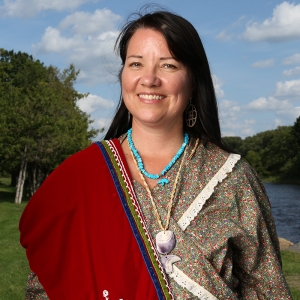
Kahente Horn-Miller
Bridge-Builder
Biography
Kahente Horn-Miller, an assistant professor in Carleton University’s School of Indigenous and Canadian Studies, thinks a lot about the word “conciliation” — which is defined as “the action of bringing into harmony” — and the need for a new relationship between Indigenous and non-Indigenous peoples in Canada, one based on mutual respect.
As Carleton continues to address the Calls to Action of the Truth and Reconciliation Commission (TRC), Horn-Miller (whose first name means “she walks ahead” in the Kanien:keha/Mohawk language) plays a lead role. She is helping to create a new Indigenous Learning Space on campus, after successfully pushing for a name change for her department from the School of Canadian Studies to the School of Indigenous and Canadian Studies.
“The Indigenous Learning Place is a wonderful opportunity for Carleton to engage Indigenous students, faculty and the broader community in a necessary dialogue that speaks to our efforts to implement the TRC Calls to Action in a way that is tangible, timely and relevant,” says Horn-Miller. “The space is about making Carleton’s campus relevant to Indigenous students and faculty. A place for dialogue and sharing.”
A mother to four daughters who earned her PhD in Humanities at Concordia University in 2009, Horn-Miller conducts research and writes on issues such as Haudenosaunee culture and community, Indigenous research methodologies, Indigenous women, identity politics, colonization, Indigenous governance and consensus-based decision making.
Horn-Miller’s performance, governance work and community-based research involves interpreting Haudenosaunee culture and bringing new life to old traditions. Her performance “We Are In Her And She Is In Us” brings to life the Haudenosaunee “Sky Woman Creation Story.”
Through her teaching, Horn-Miller challenges students to learn about Indigenous cultures and about themselves as humans on Turtle Island (native name for North and South America), which in the long term will foster relationships between Indigenous and non-Indigenous peoples that go beyond the written word and classroom and research settings.
“We have a lot important knowledge to share,” says Horn-Miller.



